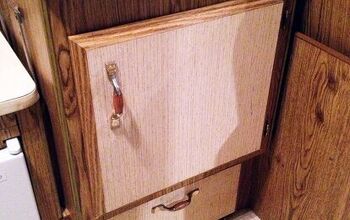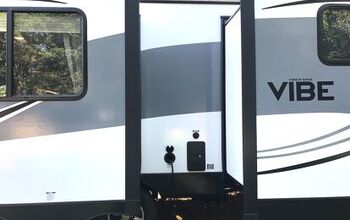5 Emergency Power Options: Generators & Battery Solutions

Inspired by recent events, this new Simplify series is all about emergency prep and how to be ready for difficulties brought on by natural disasters.
When a hurricane or other natural disaster strikes, one of the most common challenges homeowners face is losing power, often for days or even weeks.
Without electricity, everyday tasks like keeping food cold, powering essential medical devices, and staying connected to news and communication channels can become difficult.
Fortunately, there are several emergency power solutions that can help keep your household running during a hurricane-induced blackout. Here's a comparison of various options, from portable generators to solar-powered devices and battery packs.
Table of contents
Disclaimer: Simplify may receive a small affiliate commission from purchases made via links in this article but at no cost to you.
1. Portable Generators
How They Work:
Portable generators run on gasoline, diesel, or propane and convert mechanical energy into electrical energy. They can power multiple devices simultaneously and are typically used to run refrigerators, lights, fans, and other household essentials during power outages.
Westinghouse Outdoor Power Equipment 12500 Peak Watt Dual Fuel Home Backup Portable Generator
Pros:
- Power Output: Portable generators can provide significant power, ranging from 2,000 to 10,000+ watts, depending on the model.
- Versatile: They can power larger appliances like refrigerators, freezers, and sump pumps.
- Immediate Power: As long as you have fuel, they provide on-demand power.
Champion Power Equipment 4750-Watt Dual Fuel Portable Generator with Electric Start
Cons:
- Fuel Dependency: Requires a constant supply of fuel (gasoline or propane), which may be hard to obtain during a storm.
- Noise: Generators can be quite loud, which may be disruptive, especially in residential areas.
- Carbon Monoxide Risk: Generators must be operated outdoors due to the risk of carbon monoxide poisoning (we advise placing a carbon monoxide detector in your home for peace of mind).
- Maintenance: They require regular upkeep to ensure proper functioning when needed.
Kidde Carbon Monoxide Detector, Plug In Wall with AA Battery Backup
Best For:
Homeowners looking for a reliable backup power source for essential appliances and tools during a prolonged outage.
Tip: When using a portable generator, always keep it at least 20 feet away from your home and never run it inside enclosed spaces, including garages.
2. Solar-Powered Generators
How They Work:
Solar generators harness energy from the sun using solar panels and store it in batteries for later use. Unlike fuel-powered generators, these are clean energy alternatives that don’t rely on gas or diesel.
Takki 120W Peak Solar Generator Portable Power Station with 21W Solar Panels
Pros:
- Eco-Friendly: No harmful emissions or fuel needed; they run entirely on renewable energy.
- Quiet: Since there’s no combustion engine, solar generators operate silently.
- Low Maintenance: Solar generators don’t require as much maintenance as gas-powered generators.
- Indoor Use: Safe to use inside the home because there are no fumes.
Portable Solar Generator, 300W Portable Power Station with Foldable 60W Solar Panel
Cons:
- Limited Power Output: Solar generators generally provide less power than fuel-based options. They are better suited for smaller devices like phones, laptops, lights, or medical devices.
- Weather Dependency: Solar panels need sunlight to recharge, which can be a challenge during stormy weather.
- Cost: Higher initial investment compared to traditional generators, though long-term costs are lower due to free solar energy.
EF ECOFLOW 110W Portable Solar Panel, Foldable with Carry Case
Best For:
Those looking for a clean, quiet, and renewable energy solution to power smaller electronics and critical medical devices. Ideal for eco-conscious households or those in areas where fuel might be scarce after a storm.
Tip: Consider pairing solar generators with portable solar panels that can recharge the battery even on cloudy days for added peace of mind.
3. Inverter Generators
How They Work:
Inverter generators use advanced electronics to convert raw power from the generator into cleaner electricity, suitable for sensitive devices like laptops and smartphones. These generators are quieter, more efficient, and offer better fuel economy than traditional portable generators.
Westinghouse 2550 Peak Watt Super Quiet & Lightweight Portable Inverter Generator
Pros:
- Quiet Operation: Much quieter than conventional portable generators.
- Fuel-Efficient: Automatically adjusts the engine speed to the power load, saving fuel.
- Clean Power: Produces stable electricity, ideal for powering sensitive electronics.
- Compact: Smaller and more portable than traditional generators.
Cons:
- Cost: Inverter generators tend to be more expensive than conventional portable generators of the same size.
- Power Output: While efficient, they usually offer less power than traditional generators, making them less suitable for heavy appliances.
Honda EU2200ITAN 2200-Watt 120-Volt Super Quiet Portable Inverter Generator with CO-Minder
Best For:
Homeowners needing to charge sensitive electronics and run smaller appliances. Great for those who value fuel efficiency and quieter operation.
Tip: If you prioritize quiet operation and only need to power essential devices, an inverter generator can be a perfect balance between power and portability.
4. Battery Backup Systems (Power Banks and Power Stations)
How They Work:
Battery backup systems, such as high-capacity power banks and portable power stations, store electrical energy in rechargeable batteries. These systems don’t generate electricity but instead serve as backup power storage that can charge or run small devices when the grid goes down.
Portable Power Station 300W 257wh Lithium Battery
Pros:
- Portable: Lightweight and easy to transport, battery backups can be used indoors or outdoors.
- Quiet: No noise since there’s no engine or fuel involved.
- No Fuel Required: Battery backups don't rely on gasoline or diesel.
- Easy to Use: Simply charge the system before a storm and use it as needed.
MARBERO Portable Power Station 88Wh Camping Lithium Battery Solar Generator
Cons:
- Limited Power: Only suitable for small devices like smartphones, laptops, and LED lights. Larger appliances will quickly drain the battery.
- Recharge Dependency: If the battery runs out and you don’t have solar or generator options, it may be challenging to recharge.
INIU Portable Charger, Slimmest 10000mAh 5V/3A Power Bank
Best For:
People looking to power small devices or electronics for short-term outages. Also useful for keeping your phone and essential communication devices charged in case of emergency.
Tip: Invest in a larger-capacity power station to extend battery life and power more devices.
5. Whole-House Generators
How They Work:
Whole-house generators are permanently installed systems that automatically activate when the power goes out. They run on natural gas or propane and can power your entire home, including HVAC systems, refrigerators, and lights.
DuroMax XP13000EH Dual Fuel Portable Generator 13000 Watt Gas or Propane Powered Electric Start
Pros:
- Powerful: Can provide enough electricity to run your entire house, including large appliances and heating or cooling systems.
- Automatic Activation: Automatically switches on during a power outage, ensuring a seamless transition.
- Long-Term Solution: Can run for extended periods, as long as the fuel supply is available.
Cons:
- Cost: Whole-house generators are expensive to install and maintain.
- Fuel Supply: Requires a reliable supply of natural gas or propane, which can be disrupted in extreme situations.
Pulsar G12KBN Heavy Duty Dual Fuel Portable Generator, 12,000 Watt
Best For:
Those looking for a long-term, whole-house solution who want the convenience of never being without power, even during long outages.
Tip: If you live in an area prone to frequent storms or long power outages, a whole-house generator might be a worthwhile investment for peace of mind.
The Best Emergency Power Solution For Your
Choosing the right emergency power solution depends on your household needs and budget.
Portable generators offer the most power and flexibility, while solar-powered generators and battery backups are eco-friendly and quiet options for smaller devices. Inverter generators strike a balance between efficiency and performance, while whole-house generators provide seamless power for larger homes.
By preparing in advance and selecting the right power solution for your family, you can stay safe and comfortable during a hurricane or any other natural disaster, even when the lights go out.
Stay safe.













































Comments
Join the conversation